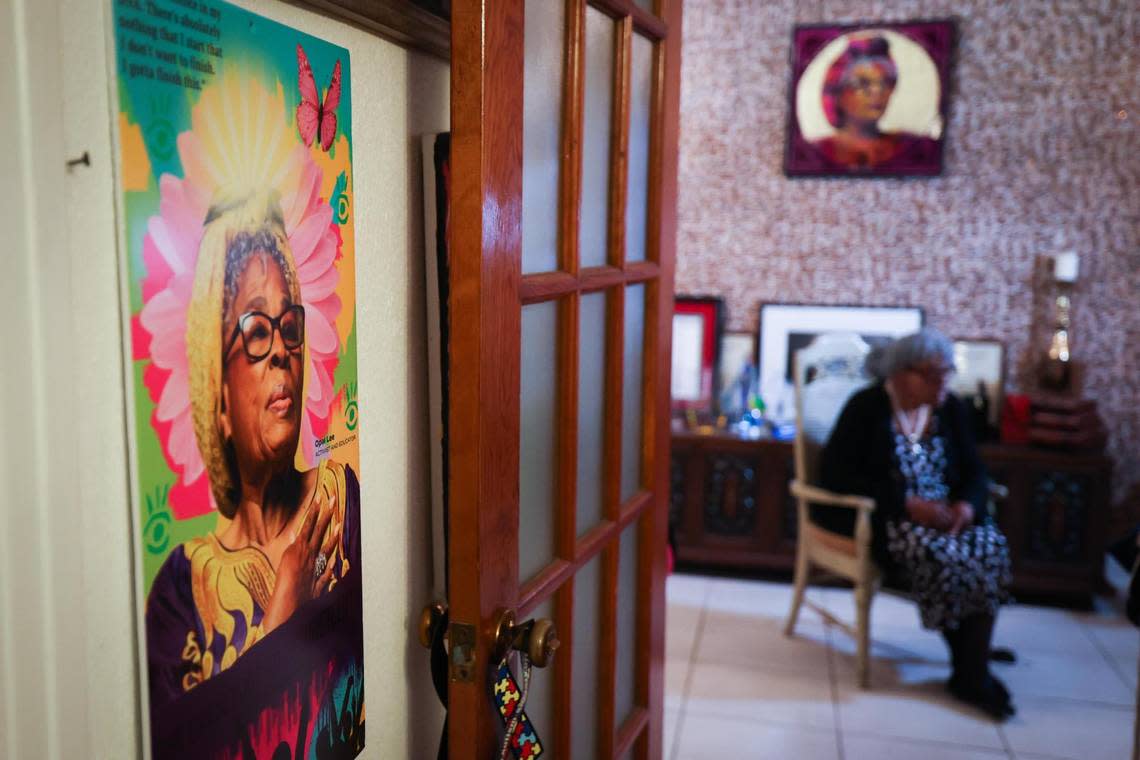Fort Worth’s Opal Lee is up for a Nobel Prize. Here’s everything you need to know
Fort Worth civil rights advocate Opal Lee is nominated for a Nobel Peace Prize.
Lee, nicknamed the “Grandmother of Juneteenth” for her role in gaining national recognition for the celebration of independence for Black Americans, was nominated by 33 members of Congress in January.
She was nominated for her campaign and her decades of activism and charity.
“Miss Opal Lee’s fight for justice and equity has made her a trailblazer in the civil rights movement in North Texas and across our country,” said U.S. Rep. Marc Veasey, who led the nomination. “It was through her relentless fortitude that Juneteenth’s recognition as a national holiday was made possible. As a lifelong Fort Worth resident, Miss Opal has worked to revitalize our city and uplift our communities.”
Here’s a quick look at the Nobel Peace Prize’s history and selection process, as well as notable 2022 nominees.
What is the Nobel Peace Prize?
The peace prize is one of the five Nobel Prizes established by Swedish scientist and businessman Alfred Nobel. According to his last will and testament, the prize should be awarded “to the person who shall have done the most or the best work for fraternity between nations, the abolition or reduction of standing armies and for the holding and promotion of peace congresses.”
The prize has been awarded every year since 1901, with some exceptions. Some years, the award is given to multiple people or an organization. In its 120-year history, 109 individuals and 25 organizations have received the prize. It’s considered one of the most prestigious awards in the world.

How the nomination and selection processes work
Anyone can be nominated for the peace prize, but nominations can only be made by qualified individuals. According to the Nobel Foundation, a nomination is considered valid if it is submitted by a person who falls within one of the following categories:
Members of national assemblies and national governments (cabinet members/ministers) of sovereign states as well as current heads of states
Members of The International Court of Justice in The Hague and The Permanent Court of Arbitration in The Hague
Members of l’Institut de Droit International
Members of the international board of the Women’s International League for Peace and Freedom
University professors, professors emeriti and associate professors of history, social sciences, law, philosophy, theology, and religion; university rectors and university directors (or their equivalents); directors of peace research institutes and foreign policy institutes
Persons who have been awarded the Nobel Peace Prize
Members of the main board of directors or its equivalent of organizations that have been awarded the Nobel Peace Prize
Current and former members of the Norwegian Nobel Committee (proposals by current members of the committee to be submitted no later than at the first meeting of the committee after Feb. 1)
Former advisers to the Norwegian Nobel Committee
Nominations must be submitted to the Norwegian Nobel Committee by the January deadline.
The five-member committee, which is appointed by the Norwegian parliament, chooses the Nobel Peace Prize laureates through a majority vote.
The laureates are set to be announced on Oct. 7, with the award ceremony set for December.
Who is nominated this year?
According to the Nobel Foundation, there are 343 candidates for the Nobel Peace Prize for 2022 — 251 are individuals and 92 are organizations.
The foundation doesn’t disclose nominees or considerations until 50 years after the award is given, but some nominators make their nominations public — like members of U.S. Congress nominating Lee.
Every year, the director of the Peace Research Institute Oslo offers their personal shortlists of the “most worthy potential laureates.”
Although the director’s shortlist is relevant, they’re not associated with the Nobel Institute or the Norwegian Nobel Committee. Some years the director’s shortlist has predicted the winner.
This year, Director Henrik Urdal’s shortlist includes:
Sviatlana Tsikhanouskaya, leader of the Belarusian democratic movement, and Alexei Navalny, a Russian opposition leader and anti-corruption activist
International Court of Justice
Indian social activist Harsh Mander and his Karwan-e-Mohabbat campaign against religiously-motivated violence
Uyghur scholar Ilham Tohti and Hong Kong politicians Agnes Chow and Nathan Law
The Human Rights Data Analysis Group (HRDAG) and the Center for Applied Nonviolent Action and Strategies (CANVAS)
Other nominations made public by nominators include Greta Thunberg, The Arctic Council, Black Lives Matter, Edward Snowden, Pope Francis and Masih Alinejad.
Past American winners
The U.S. has had 23 Nobel Peace Prize laureates, including former presidents Barrack Obama, Jimmy Carter, Woodrow Wilson and Theodore Roosevelt. Other American winners include Henry Kissinger, Al Gore and Jody Williams.
Ralph Bunche was the first Black man to win a Nobel Prize in 1950. Martin Luther King Jr., Bunche and Obama are the only three Black Americans to win the peace prize. Toni Morrison was awarded the Nobel Prize in Literature in 1993.
